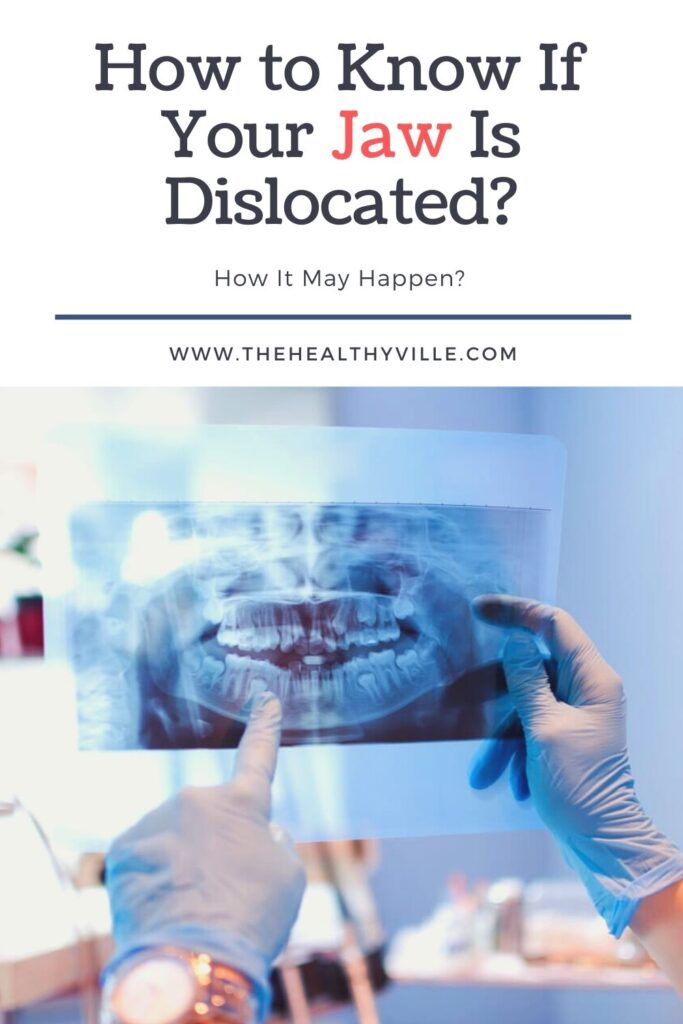How to know if your jaw is dislocated? A dislodged jaw is a rare condition, but it can be uncomfortable. Learn its possible causes and treatments.
Have you ever had a lopsided jaw? The medical term for this condition is temporomandibular dislocation. This joint typically has various tendons and ligaments that hold it in place. However, they can fail and present this situation.
The condition occurs when one of the components of the joint, called the condyle, separates from the joint surface and travels over the temporal bone. It is very common for this displacement to occur towards the anterior plane of the same, however, it can move in any direction.
For what reasons can the jaw dislodge?
Before knowing the possible causes that cause a dislocated jaw, it is important to remember that this is a rare condition. In fact, various studies claim that it represents only 3% of all dislocations. For this reason, there is much disagreement about its main origin.
What we can say with certainty is that the causes will depend on the type of dislocation that we find. When it comes to an acute dislocation, that is, one with minutes or hours of evolution, the most frequent cause is usually a trauma.
In this sense, situations that involve a direct blow in this region could dislodge the jaw. However, it should not be ruled out that this injury has occurred spontaneously. In this way, it can originate from various situations that involve opening the mouth a lot or keeping it open for a long time:
- Yawning.
- Laughs.
- Vomiting.
- Dental treatment.
- Endotracheal intubation.
Another type of mandibular dislocation is the chronic recurrent one, which is defined as a constant variant over time and involves wear of the joint components. In this case, the most frequent causes of a dislocated jaw are spontaneous.
Read more: 5 Dental Solutions That Help You Take Care of Your Oral Health
On the other hand, the jaw can easily disengage in those with bruxism or a psychiatric disorder. This is due to the constant stress to which you put the joint.
How to know if your jaw is dislocated?
People with this injury usually present sudden pain in the jaw region, usually of the stabbing type, which will limit chewing and movement. Also, the joint will click when moving.
In summary, the two characteristic symptoms are joint pain and noise. On the other hand, you can also notice the deviation of the jaw, either towards the healthy side or forward.
Furthermore, many patients report not being able to close their mouths or achieve dental occlusion. However, these signs may vary, so we can find patients with an evolution of months, because they did not feel discomfort.
The doctor must use all the elements of the medical history to achieve a correct diagnosis. In this regard, you will need to investigate the characteristics of the pain and perform a thorough physical examination of the joint. Sometimes an x-ray will be necessary as a confirmatory method.
Which is the treatment?
The treatment for a dislocated jaw is medical. Therefore, it is important to turn to health personnel when you suspect you have one.
When it comes to acute dislocations, in most cases they can be reduced using the Nelaton or Dupuis maneuvers. These will vary if it is a bilateral or unilateral variant, respectively.
Both maneuvers have the same principle; The doctor will insert his thumbs into the oral cavity and place them on the lower molars. You will then press down while trying to lift your chin, creating negative pressure or tension that will pull the mandibular condyle into place.
In some cases, especially with stressed patients, it will be necessary to use general anesthesia to facilitate the process. After performing the maneuver, you may need a bandage to stabilize the area for a few days.
In cases of more severe or chronic recurrent acute dislocations, a surgical procedure may be necessary. However, the use of botulinum toxin is beneficial in avoiding interventions in certain patients.
On the other hand, a physiotherapeutic treatment will help regain the functionality of the joint. Therefore, doctors will recommend it in cases of recurrent chronic dislocations.
What to do if you have this problem?
Despite not representing an immediate danger to life, this pathology can be very annoying and make it difficult to carry out daily activities. In case of having a dislodged jaw, the first thing you should do is go to a health professional.
Only then can you reverse the problem with the maneuvers and start appropriate treatment with analgesics and anti-inflammatory drugs. In case of a recurring problem, it is best to go to the same specialist to take the relevant measures.
Don’t forget to SHARE how to know if your jaw is dislocated with your friends and family on your social networks!

